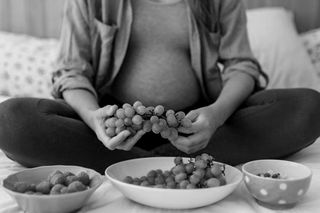
Eating Disorders Are Common Among Pregnant Women, But Support Is Lacking
“These women should be offered extra support.”

Since high school, Kriti Gulati had been fighting bulimia. Once she became pregnant, her eating disorder did get slightly better because she threw up less often. But that didn’t mean it had disappeared, she says — it just was less active.
Pregnancy brings about many changes in the human body but for women who have had or are suffering from eating disorders — a group of mental health conditions linked by fixations on weight, food, and body size — these changes can prompt deep anxiety. The three most common forms of eating disorders include anorexia nervosa, bulimia nervosa and binge eating disorders. Like most mental health struggles, eating disorders are bio-psychosocial illnesses, sparked by a complex interplay of genetic, biological, psychological and emotional factors; treatment often takes a holistic approach that could involve nutrition education, psychotherapy and medication.
And like most mental health struggles, eating disorders, especially in pregnant women, are met with stigma and shame, even among the medical community, keeping many from the treatment they need.
*
Eating disorders during pregnancy are surprisingly common. According to the National Center for Biotechnology Information (NCBI), a US-based library of medicine, eating disorders, which are most commonly found among women of reproductive age, affect between 5.1 to 7.5% of women during pregnancy, globally. Per another 2013 study, by researchers from the Norwegian Institute of Public Health who studied the prevalence of eating disorders in more than 77,000 pregnant women, one in every 21 women had an eating disorder while pregnant.
“Most were cases of binge-eating disorder (BED), a condition characterized by recurring episodes of binge eating followed by shame, distress, and guilt,” as reported by Insider, an online publication that carried the study.
The study found that, although eating disorders in some pregnant women were pre-existing, other mothers-to-be developed an eating disorder for the first time during pregnancy; for example, 1.7% of the women developed while pregnant a new case of binge eating disorder, an eating disorder characterized by regularly eating beyond full and feeling shame, disgust and a lack of control over eating habits.
Related on The Swaddle:
The Unique Factors That Contribute to Eating Disorders in India
Eating disorders are distinct from many other mental health struggles during pregnancy, when the trigger — everything a woman eats, or doesn’t eat — affects not only her physical and mental health, but also fetal growth.
“Many ED patients will improve during pregnancy; others don’t,” says Dr Shaima Beg, a Mumbai-based gynecologist. For the former, the importance of eating healthily to enable the baby to grow and develop “may help to take the focus off her own weight,” she adds. Among the latter, “for some, pregnancy may even prompt a relapse if they are in the process of recovery or have already recovered.”
Studies have shown that women with active anorexia nervosa — an eating disorder characterized by very low body weight, a deep fear of weight gain, and a skewed perception of one’s own weight or body shape — were more likely to have smaller babies compared to the general population. On the other hand, women with bulimia nervosa — an eating disorder characterized by bouts of bingeing and purging and feeling a lack of control over one’s own eating — were significantly more likely to have a history of miscarriage. Premature labor is also a risk for pregnant women with an eating disorder. Certain over-the-counter medications that people suffering from eating disorders may use, like laxatives, appetite suppressants or diuretics, may not be safe for pregnancy. And anecdotally, Dr Beg says, breastfeeding — an activity highly dependent on the mother’s nutritional state — seems to be more difficult for women with an eating disorder. “But each case is different based on the severity of the ED, general health of the mother,” she says.
*
The risk, however, is not only for the health of the pregnancy and baby. Aside from the potential physical fallout of an eating disorder, women with eating disorders during pregnancy are at increased risk of postnatal depression. (Eating disorders even outside of pregnancy are associated with depression, anxiety disorder, and/or obsessive-compulsive disorder.)
“When women without EDs are at a risk of postnatal depression, for women with EDs it’s the added stress of pregnancy — body image, weight gain, loss of control — that makes them more vulnerable to postnatal depression,” says Dr Adnan Mir, a Mumbai-based psychologist.
The postpartum period is also a tricky one even for women in recovery from an eating disorder. “The most risky bit is that women with EDs are at an increased risk of relapse of the disorder after delivery,” Dr Beg says. “Women with a history of EDs need to be monitored frequently during pregnancy and postpartum.”
Says Dr Mir, “These women should be offered extra support, especially during breastfeeding.” Dr Beg stresses the importance of making women with eating disorders aware of natural and healthy body changes, cravings, proper nutrition, and more, associated with pregnancy.
Related on The Swaddle:
Struggling with Postpartum Depression in India
Unfortunately, these women, grappling with potentially multiple mental health truggles, often slip through the cracks at this most vulnerable point. Doctors observe that the main barriers to identifying eating disorders during and after pregnancy are stigma and insensitivity by health care professionals. “Even though there’s more awareness about perinatal mental health around the world and ways to improve it, there’s little consideration for ED, and it continues to be neglected,” says Dr Mir, who calls for sensitive screening for eating disorders to be included in pre-pregnancy counselling sessions. Prenatal health care is only starting to include screening for postpartum depression, which in some cases can develop during pregnancy, but eating disorders just aren’t on physicians’ checklist. Even in the more developed health care systems of the West, diagnosis and treatment for eating disorders in women, during or outside of pregnancy, is made difficult by lack of awareness and stigma. “There will be ways to observe nutritional levels for the mother, focus on obesity, but no focus on looking for presence of an ED that may be affecting nutrition,” says Dr Mir.
This leaves families as the greatest support system for pregnant women with eating disorders — and leaves many women without the treatment they need to get better.
“Women with ED are often reluctant to disclose their ED to a health professional that makes it difficult to deal with it on two levels — they don’t seek treatment themselves and also makes it difficult for professionals to detect it to offer treatment,” Dr Mir says. “Subsequently, women with ED may go undetected during pregnancy and postnatally, with potential implications for adverse maternal and infant health outcomes if disorders are not managed appropriately.”
Anubhuti Matta is an associate editor with The Swaddle. When not at work, she's busy pursuing kathak, reading books on and by women in the Middle East or making dresses out of Indian prints.
Related


What’s It Like To Live With: A Partner With Depression
